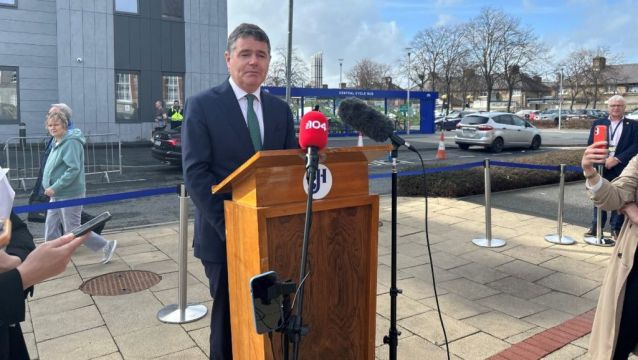The Minister for Public Expenditure has warned that if the level of inflation does not come down quickly, “we will be even poorer for longer”.
Paschal Donohoe said interest rate policy and decisions on government spending have a role to play in reducing inflation.
Asked if he considered the European Central Bank's 2 per cent inflation target realistic, he said it was “realistic and achievable”.
“An Irish economy that has levels of inflation of 6, 7 or 8 over per cent within it year after year will very rapidly become a poorer country,” he said
Mr Donohoe was speaking at the announcement of a package of actions to improve delivery of National Development Plan (NDP) projects.
“What we are aiming to do is to remove administrative barriers which we believe now are unnecessary,” he said.
The action includes significant changes to reduce the administrative burden in delivering major capital projects.
Under the reforms, the Public Spending Code, which sets out the approvals process for new projects, will be removed and replaced by a set of Infrastructure Guidelines.
This is designed to reduce the number of approval stages prior to implementation of projects from five to three.
The level of cost at which a new proposal is considered a major project is also raised from 100 million euro to 200 million.
Mr Donohoe said this will allow for projects below this limit to proceed more speedily through the appraisal and evaluation process compared to those of greater scale and complexity.
He said there are between 100 and 150 projects that will fall below the new threshold, many of which will be healthcare projects like new hospital wards.
He said measures to reduce the number of approval stages will improve delivery by four-six months.
Mr Donohoe was speaking outside a new three-storey “fast-track modular unit” at St James’s Hospital which is used for urgent cardiology and respiratory services and was developed under the NDP.
Great to get a tour of the new 3 storey, fast-track cardiology/respiratory modular unit at @stjamesdublin which was delivered last year under the NDP. Reforms announced today represent a new approach to speeding up delivery of essential projects https://t.co/Ls7o4Ufu8Z pic.twitter.com/gzBUx92y79
— Paschal Donohoe (@Paschald) March 29, 2023
The Minister will also take a direct role in overseeing delivery of the NDP by chairing a reconstituted Project Ireland 2040 Delivery Board, which will meet on a quarterly basis.
It will comprise the existing independent members and key Secretaries General.
Asked if this was to put more pressure and accountability on Secretaries General, Mr Donohoe said they already feel responsibility for delivering projects.
“So there’s already a very high onus at the moment across Government departments on making things happen.
“But I think it is very appropriate now, given the size of the capital budget that we now have – it’s over 12 billion euro for this year – that this work be chaired at a political level,” he said.
Capacity reviews of departments and agencies with significant delivery programmes will be carried out, where appropriate, to ensure that adequate resources for project delivery are in place.
Direct reporting to Government on NDP delivery on a quarterly basis throughout 2023 and 2024 will also take place.
Last week, Minister for the Environment Eamon Ryan said delays with An Bord Pleanala decisions are the “greatest constraint facing the country” in terms of delivery on transport, housing, energy and other infrastructure projects.

Asked if he agreed with the comments, Mr Donohoe said Mr Ryan was right in regard to transport and climate projects.
“We now have a very, very large collection of very important transport and energy projects that will have to receive an independent evaluation through the planning process.
“That is going to take time and I don’t want to and should not and will not influence the decision in any way, but we need to enable them and support them in making those decisions in the speed they want.”







